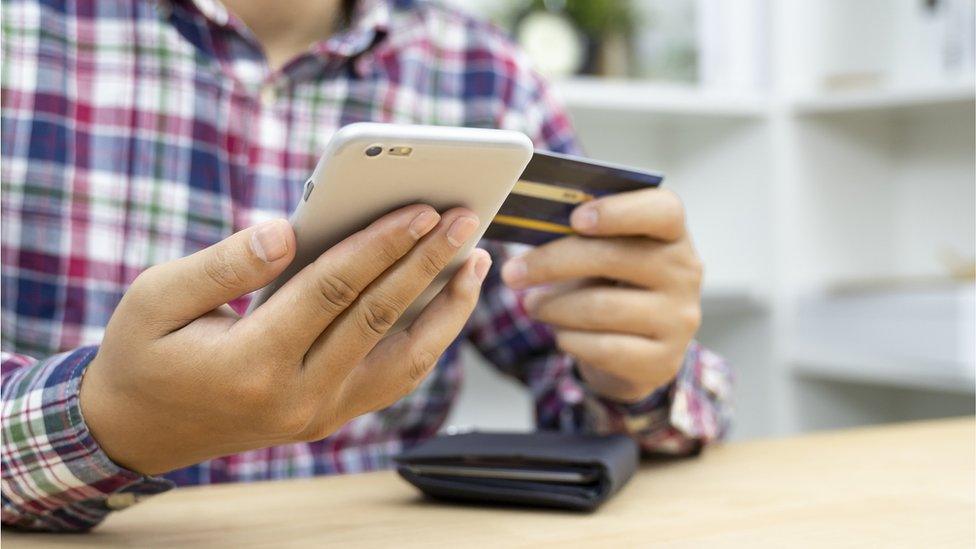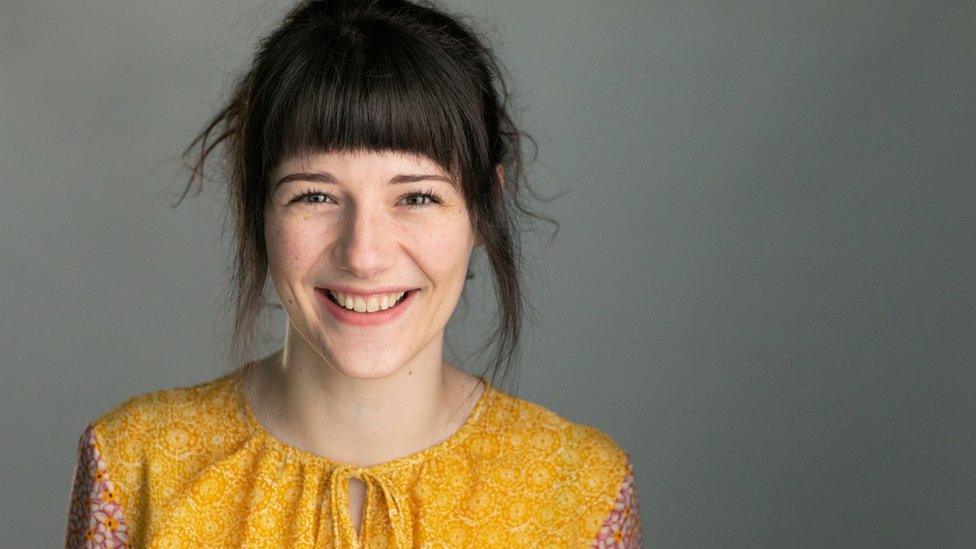Covid: Fraud reports in Wales up by 25% during pandemic
- Published

Victim Support said it had seen a large increase in fraud referrals in Wales
Fraud reports in Wales have increased by more than 25% since the start of the Covid pandemic, figures have shown.
Data from Action Fraud showed there were a total of 18,061 reports of fraud in Wales from April 2020 to March 2021, up from 14,277 in the previous year.
BBC Wales has spoken to people who said they noticed an increase in cold calls from phone numbers almost identical to their own.
Trading Standards has warned people not to click on links in text messages.
The most common types of fraud reported in Wales were online shopping and auction fraud, computer software service fraud and advanced fee fraud - where people make upfront payments for goods which do not arrive.
There were about 575 fraud reports in Wales for every 100,000 people compared to an average of about 650 reports per 100,000 people for England, Wales and Northern Ireland combined.
Across the three nations there were 389,328 fraud reports resulting in the loss of about £1.7bn.
Charity Victim Support also said it had received an average of 716 fraud referrals in the first three months of 2021, compared to 371 for the same period in 2020.
Overall, it said it received 7,617 fraud referrals in Wales between April 2020 and March 2021, compared to just 4,536 over the previous 12 months - an increase of almost 70%.
'Noticeable increase' in cold calls
A number of people have told BBC Wales they have experienced an increase in possible scam calls over the past few months.
Lloyd Warburton, a student from Aberystwyth, tweeted last month about a number of calls he had been receiving from numbers he did not have saved in his phone, but were very similar to his own.
Allow X content?
This article contains content provided by X. We ask for your permission before anything is loaded, as they may be using cookies and other technologies. You may want to read X’s cookie policy, external and privacy policy, external before accepting. To view this content choose ‘accept and continue’.

Allow X content?
This article contains content provided by X. We ask for your permission before anything is loaded, as they may be using cookies and other technologies. You may want to read X’s cookie policy, external and privacy policy, external before accepting. To view this content choose ‘accept and continue’.

He said: "I don't get many scam calls. They seem to come in clusters.
"I used to get them quite a lot, but then they dropped off for a few years. There has been a noticeable increase, I would say, over the last nine months or so.
"I get all sorts. The impersonated numbers are the most common, but I get texts quite often claiming to have a parcel waiting for me to collect, or similar, when they're clearly just from someone's mobile."

Lloyd Warburton tweeted about scam calls he had been receiving from numbers similar to his own
Peter Irvine from Aberaeron in Ceredigion, a student at the University of Bath, said he had noticed a similar trend starting earlier this year.
He said: "I received the first call on 15 February this year, I thought it was odd that it had the same initial six digits as my number. I answered and it was completely silent, and then put the phone down after."
Mr Irvine said he received another call later that month, with that phone number saying it had the same seven initial digits as his phone number.
He said he has had another eight of these calls throughout the spring.
"They all have the same six to seven initial digits that match my number, so I don't think it's very coincidental at this point," he said.
Allow X content?
This article contains content provided by X. We ask for your permission before anything is loaded, as they may be using cookies and other technologies. You may want to read X’s cookie policy, external and privacy policy, external before accepting. To view this content choose ‘accept and continue’.

Carol Gerrard from Cardiff said she had also noticed an increase in potential scams during the Covid pandemic.
She said: "I rarely received them prior to the pandemic, maybe once or twice a year, but in the last month I have had at least six.
"My husband seems to get them even more than I do - he regularly has two or three a week, even though we block the numbers immediately.
"I get emails too, usually they are purportedly from Amazon or PayPal, but last month I had one from my email provider asking me to click on a link to update my account as I had exceeded my limit. The fact that it had gone to junk box alerted me."
Allow X content?
This article contains content provided by X. We ask for your permission before anything is loaded, as they may be using cookies and other technologies. You may want to read X’s cookie policy, external and privacy policy, external before accepting. To view this content choose ‘accept and continue’.

How can I avoid scam calls and texts?
Alison Farrar from Trading Standards Wales said there was a new text message scam relating to the census, and warned people to not click on any links if they receive a message about it.
She said: "Scam calls and texts to mobile phones are a serious problem - there is no mobile phone equivalent to a landline call blocker to stop them coming through.
"Some of these messages are very convincing. Remember that no government agency would send you a notification demanding money via text or via automated telephone message.
"If a company sends you a link via text message to click on, ignore it. If you are unsure because you have an account with that company, contact them directly and don't use the link provided."
Welsh police forces said any scam texts should be forwarded to 7726, while emails can be forwarded to report@phishing.gov.uk.
Trading Standards also advised blocking landline numbers and registering with the telephone preference service.
Have you been affected by a scam or a fraud in the past year?
Use the form below to get in touch and tell us about your experience.
If you are reading this page on the BBC News app, you will need to visit the mobile version of the BBC website to submit your question on this topic.
- Published12 May 2021

- Published23 March 2021
